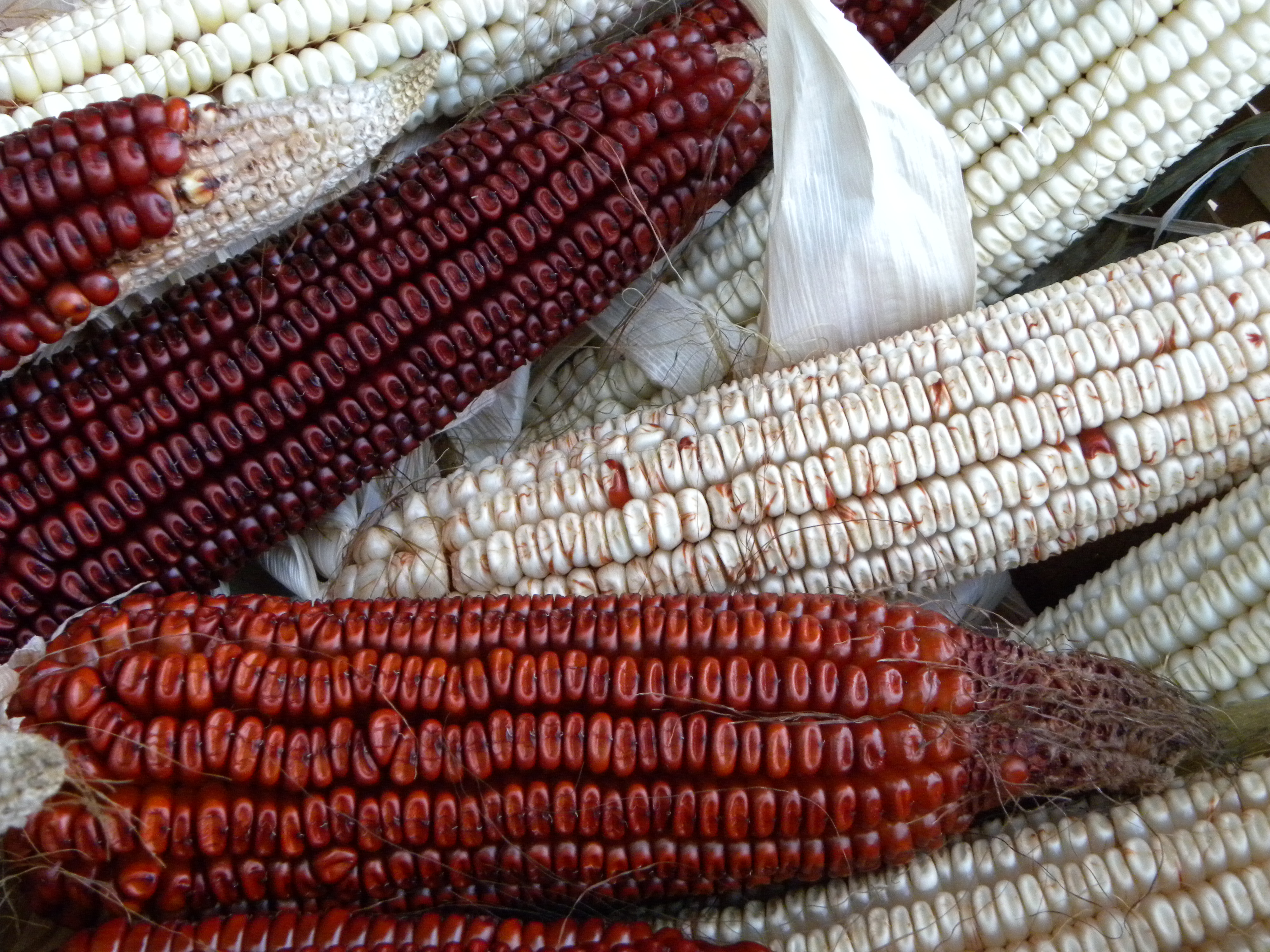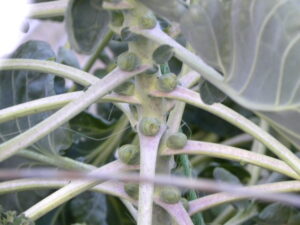“Where do I start?” This question was asked of myself and 3 other panelists after a showing of the film “Seed: The Untold Story.”
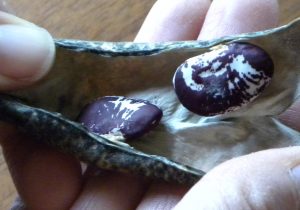
Christmas Lima Bean
The Music Hall in Portsmouth NH screened this new documentary earlier in November and I was privileged to be on a panel for discussion following it with Andrea Cadwell, founder of Seeds of Community, Evan Mallett, Black Trumpet Bistro Chef/Owner and Heirloom Harvest Project Co-founder, and Erik Wochholz, Horticulturist and Curator of Historic Landscapes at Strawbery Banke Museum.
My quick summary of the film is that there has been a tremendous loss of diversity in our food supply, and a loss of control over seeds by those who actually grow food, brought on by the transition of seed out of the commons and into the realm of corporations. It also showed some of the dangers of conventional agricultural practices of pesticide and herbicide use, and geneticially modified food. The information in the film was disturbing, but the accounts of communities who are reclaiming their seeds and protesting the abuses of corporations was inspiring. And the photography was beautiful.
Back to our question – Where do I start?
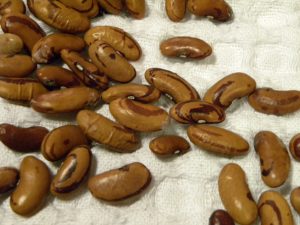
Tiger Eye Bean
This is an especially great question to contemplate when the topic is seed, because a seed is a start in itself. In every seed there is the possibility to begin life again for the plant that created it. If it gets what it needs to kick off and support the process (cold, fire, or simply soil and water, for instance), it will grow. All the directions it needs to become just what it’s meant to be are there. I have been farming or gardening for 20 years now, and I never fail to feel awe, gratitude and joy when a seed I planted sends up a shoot and down a root. Every time feels like a miracle, like magic.
For us humans, we struggle more with figuring out just what we’re meant to be and do. I can’t know what your answer is, of course, but here are my thoughts in response to being asked the question after the film last week.
First of all – it doesn’t really matter where you start! Even when you think of a seed, you can ask was the seed the beginning or was the plant that made the seed there first? It’s a circle, like so much in nature, and just stepping into the flow of it is what’s important. Which brings me to a question for you: what appeals to you, what do you feel called to or inspired to do on this subject? That’s a great place to focus.
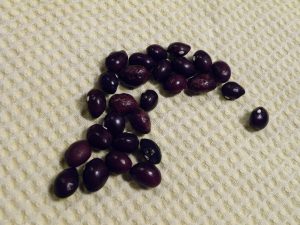
True Red Cranberry Pole Bean
There are so many ways to be a part of this movement to take back our power. There has been a tendency in our society these last 100 years or so to decide that if something takes a lot of work, we’d be better off to have someone else do it for us and call that freedom. In some cases it just means we have to do other work in order to pay someone to do the original task for us, often with lower standards and less care. Other things have become so cheap that I guess we do get extra free time – which a lot of people spend watching TV or on Facebook (I don’t mean to judge – my life has some TV & Facebook as well!). I believe this amounts to trading away our real sovereignty and control over our lives.
So, on that personal level, do grow a garden, keep small
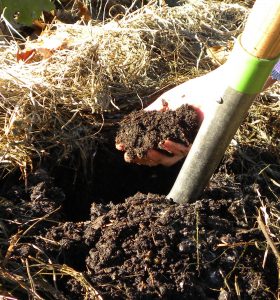
My Garden Soil
livestock, or go beyond that and become a farmer! We need more small-scale, deeply sustainable food growers. Use your yard, a community garden, or look for larger areas of land. Any food you grow will be fresher than almost anything you can buy, and won’t have the transportation footprint of supermarket options. What you don’t grow, look for locally at farmer’s markets, farm stands, CSAs, and sometimes healthfood stores. Learn to build your own soil – a dwindling resource that we are totally dependent on. I teach permacultural soil building techniques through Seacoast Permaculture if you are local. And, yes, save your seeds! For what you haven’t saved, turn to ethical seed sellers to buy from such as Fedco, High Mowing. and Seed Savers Exchange.
However, the problems we face are beyond one person’s ability to change. Join with others and make change on larger levels.
You can join groups working to educate about these issues and bring back these skills such as Seacoast Permaculture, Slow Food Seacoast, Seacoast Eat Local and NOFA.
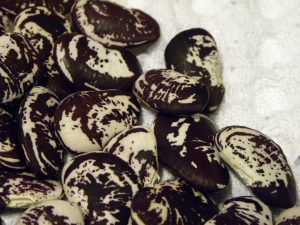
Christmas Lima Beans
You can get involved in efforts to change legislation like GMO food labeling, pesticide use, and supporting small farmers. A few options are NOFA-NH, Just Label It, The Pesticide Action Network, and March Against Monsanto.
There are also groups who are challenging the rights of corporations to patent life, and to have so much political clout. Seeds and food are not the only issues in which huge entities organized solely to make profit are deciding our future. NH has a history of challenging this problem, led by our own Doris “Granny D” Haddock, who walked over 3,200 miles across the United States to advocate for campaign finance reform at the age of 88 years old. Her work is carried on now by The NH Rebellion.
I should say that all of these groups are non-partisan. Regardless of how you feel about the recent election you are welcome in them!
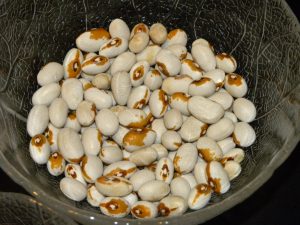
Maine Yellow Eye Beans
I hope this gives you ideas on where you might be able to step in and make a difference on sustainable food and diversity. The great news is that any of these steps are fun, and fulfilling. They’ll improve your health and life. Sure, it takes some work – but don’t most things worth having?
It’s worth noting that this film looked at food plant diversity, but the same situation is faced for livestock breeds. I encourage you to research that, and maybe that will be their next documentary!
ADDENDUM: I didn’t feel like the film did a great job of precisely explaining some of the terms used in reference to seeds. I thought I’d give you a few definitions, especially if seed saving is something that you now want to try your hand at after seeing this beautiful film:
Heirloom: a plant variety that has a history of being passed down within a family or community. All heirlooms are open-pollinated, but not all open-pollinated plants are heirlooms.
Open pollinated: seeds that will “breed true.” When the plants of an open-pollinated variety self-pollinate, or are pollinated by another of the same variety, their seeds will produce plants generally identical to their parents. Saving seed from these plants is accessible to all farmers and gardeners.
Hybrid seed: seed produced by cross-pollinated plants. This can occur naturally, but in our commercial seed stock, hybrids are created by human intervention. The positive side of this is the phenomon of hybrid vigor which makes these crosses vigorous and high yielding. However, the seed produced is genetically unstable and cannot be saved for use in following years, which leads to a dependency on seed companies. Hybrid seeds can be stabilized, however, becoming open-pollinated varieties, by growing, selecting, and saving the seed over many years. Hybrid is NOT the same as Genetically Modified, which bypasses nature’s species boundaries through laboratory means to create plants which would never occur naturally.
You can learn more about seed types here.
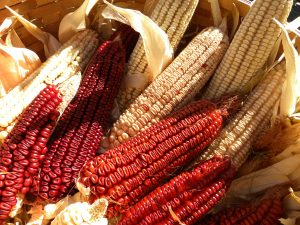
Hop McConnell Speckled Corn Harvested, 2016
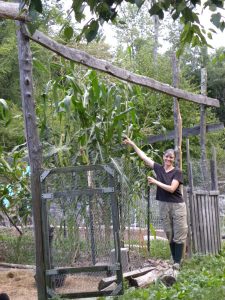
Hop McConnell Speckled Corn Growing, 2016

